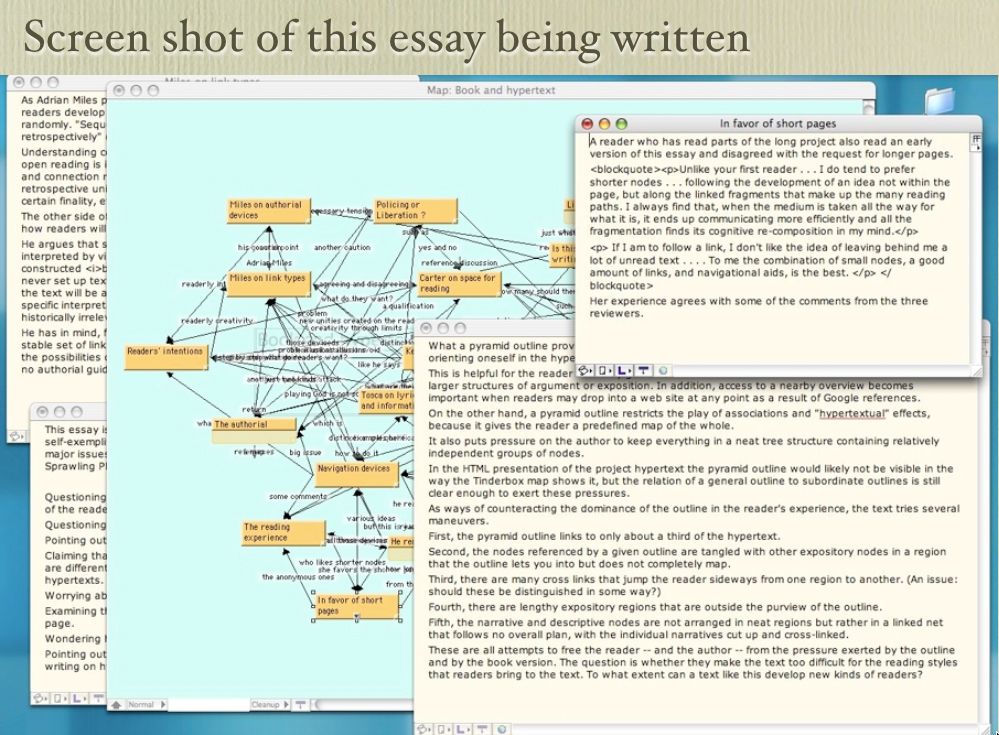My Work
I have been fascinated with changes in large systems: in methods of thought, in architecture and city planning, modes of writing, in values and religion. I see changes from centered hierarchical systems to looser networks for our lives our cities our writings and our selves. How do we analyze and judge these changes? With questions from Plato and Hegel, and clues from Dewey and I explore buildings and suburbs, abstract discussions about unity and individuality, changes in logic and religion. My writings range from high metaphysics to encounters with Japanese gardens, obscure medieval philosophers, web writing, and what’s happening to suburbia today.
Categories
Why Plato Thinks Democracy Leads to Tyranny
I delivered a talk on Plato's worries about democracy. I looked into Plato's reasons, discussed the differences between Athenian democracy and our own, and asked whether we should still be afraid. (Spoiler alert: Yes!)
Read MoreWhy Hegel? Why Now?
Reasons why Hegel is a useful dialogue partner for our present situation in philosophy.
Read MoreWhere Do the Architects Live?
Asking whether a designer has a home base or floats freely above history? An argument against both modern a-historical and postmodern ironic conceptions of design.
Read MoreWhat is Open and What is Closed in the Philosophy of Hegel?
This essay studies the ways in which Hegel's thought demands "closure," critiques various proposals for an "open Hegelianism," and concludes that Hegel cannot achieve the closure he seeks, and that "open Hegelianisms" are not Hegelian...
Read MoreUniversal and Particular Persons and Places
What kind of cosmopolitan identity is possible in a world of assertive particular identities? This paper explores universalism by means of a contrast with the failed aspirations of modernist architects to create a style that...
Read MoreTwin Media: Hypertext Structure Under Pressure
This essay reports on issues that arise in composing a large argumentative hypertext associated with a book version of the same project. It concerns not the old navigation problem for the lost reader, but the...
Read MoreTraversal of Socrates and The Labyrinth
The live Traversal of David Kolb's Socrates in the Labyrinth took place on Friday, October 27, 2017, at in the Electronic Literature Lab. It was performed by the author who journeyed from Eugene, Oregon to...
Read MoreTiger Stripes and Embodied Systems: Hegel on Markets and Models
This essay develops from Hegel's Philosophy of Nature a different critique of the ideal of a global market society inhabited by purely rational economic actors. It extends this to critique the use of mathematical models...
Read MoreThe Tree and the Net
A short video defending electronic media against the charge of being unusually distracting.
Read MoreThe Spirit of Gravity: Architecture and Externality in Hegel
Two studies of architecture and gravity: We might say with Hegel that architecture the premier “external” art, because architecture constructs in physical space “out there” and uses external material such as wood and stone and...
Read MoreThe Revenge of the Page
A study of link patterns in web hypertexts, showing how traditional tree-structured single-jump links between long pages, typical of, say, Wikipedia, have eliminated the more complex multi-link path patterns found in early hypertext writing.
Read MoreThe Paths of Essence
This talk has two parts, the first historical and the second philosophical. I will be suggesting that the philosophical explains the historical. Many readings of Hegel's project claim that wants to show the unique necessary...
Read MoreThe Particular Logic of Modernity
A friend once said to me that he would be glad to discuss postmodemity if only he knew what modernity meant. There are so many descriptions. We're all modern: Modern society, modern art, modern philosophy,...
Read MoreThe Particular Logic of Modernity
A discussion of the logical role of particular concepts in Robert Pippin's reading Hegel as a theorist of modernity, with special reference to the question of whether modernity can be surpassed or left behind.
Read MoreThe Necessities of Hegel’s Logics
I question this idea of a pure presuppositions self-developing sequence of logical categories. This is part of a larger investigation of the inherence of Hegel's thought in historical language. Concerning the necessary self-development of thought,...
Read MoreThe Logic of the Critical Process
Hegel said that his Philosophy of Right "Philosophy always comes on the scene too late to [give instruction as to what the world ought to be]." (PR Preface). On the other hand, from his early...
Read MoreThe Logic of Language Change
How do Hegel's dialectical transitions among logical categories relate to ordinary empirical language changes?
Read MoreThe Last Word in Greek Philosophy
A study of what the Greeks philosophers thought it took to "settle" questions and end debates.
Read MoreThe Final Name of God: Hegel on Determinate Religion
Hegel's system aims at thought encompassing self-relation. There are many ways of interpreting just what Hegel is trying to achieve in that self-relation and what kind of closure, if any, it demands. It is also...
Read More